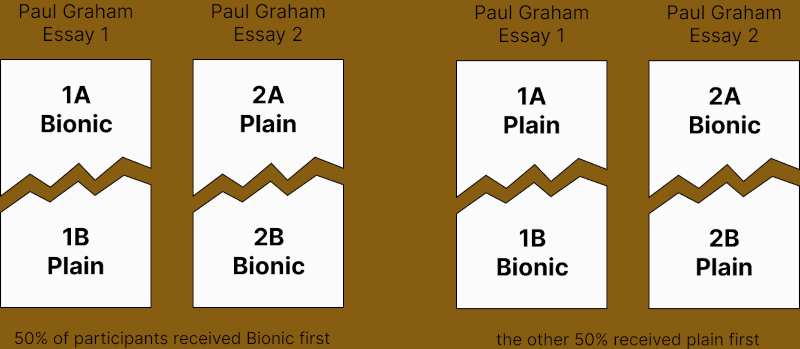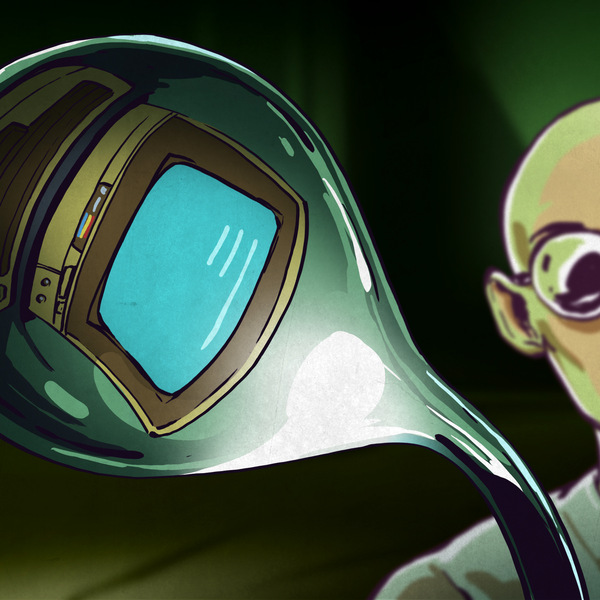In the Star Trek episode Space Seed, [Khan] famously said, “Improve a mechanical device, and you may double productivity. But improve man, you gain a thousandfold.” Most of our hacks center on the mechanical or electromechanical kind, but we do have an interest in safely improving ourselves. The problem is that most of us don’t want to mess with our DNA or have surgery, so it sort of limits our options.
We are always interested in less invasive hacks, so we certainly took note of Bionic Reading. However, a recent paper claims to debunk the claims of benefits. The company promoting the technology claims a Swiss University study showed that while the results were not clear, “the majority had a positive effect.” They also claim, anecdotally, that the technique can help those with dyslexia. What’s the truth? We don’t know, but it is an interesting discussion to follow.
If you haven’t seen it before, Bionic Reading — which, by the way, may not be free to use — is a way of using a dark font to emphasize certain key parts of words. For example, you can read this article using Bionic Reading. [Daniel Doyon] analyzed reading by 2,074 testers and found that participants actually read slower when using the Bionic Reading technique.
Even if you aren’t especially interested in Bionic Reading, the experiment design to account for taking random data from the Internet is pretty interesting all by itself. For example, they removed data from “tire-kickers” and “quitters” from the pool. To their credit, though, they did make all the data available both filtered and unfiltered.
We think you might get more mileage from entrainment. We’ve seen many brain hacks over the years, some of which even make sense.
















no question my dislexic brain reads that bionic shit much slower
My dyslexic brain reads it far faster! So it’s probably nothing to do with dyslexia 🤷♂️
I loved it! My brain relaxed with bionic reading but wad worse for my husband. I think it might be more add than dyslexia or even something else, but interesting that I want to read everything in it!
or perhaps we have different dislexia fueled
adaptations for reading
l for one, read words by their over all shape not the individual letters
so new words, and “sounding things out” is really slow and hard
for me the bionic thing made every word a “new” word so l had to look at the letters (which my brain tends to invert/scramble)
slowing me down a lot
but l can imagine that a dislexic person who doesn’t do word-shape-recognition would find the forced order of the bionic thing quite helpful
fascinating things brains
First, they monetized search. Then, human interactions and markets. Then they tried to interpose themselves in human perception. Then came hospitality and peer-to-peer transport.
Now they want to interpose themselves between my reading and me?
Sometimes, I’m glad I’m that old. It’ll be others to figure out that stinking mess. OTOH, I feel ashamed for leaving behind this for others to figure out.
The link to the Bionic version doesn’t work:
“Cannot GET /convert/url=https://wp.me/paBn4l-2hGo”
The slash before “url” needs to be a question mark.
I thought that was the bionic part, and I’ve been waiting for that url to download straight to my brain all day. Must be another Rogers outage.
from their main page:
> The Intellectual Property of Bionic Reading is based on Patent, Trademark and Copyright Laws.
It looks like GB2552586A is the patent that list the rules for Bionic Reading.
1 all words are displayed as Bionic.
2 3/5 of the beginning of a word is bold
3 2/5 of the end of a word is normal
…
7 leave numbers alone
sorry messed up 2 and 3 are both part of 2 and
3 is “3 letter words, only the first letter is bold, the remaining 2 letters are normal font”
Page 4 of 27 of the above patent lists the 7 rules.
I think it slows me down. But I am used to the technique where you recognise the whole of the word and don’t read it letter by letter, speaking in your head, and just flash each word to brain, kinda. Forgot the conventional method of describing it. This makes me stutter the word in two halves. Potentially a speedup for that “whole word” technique would be to darken the middle letter of a word to center the focus point and let the letters either side impinge on consciousness…..
Where there are a lot of new or compound words, that need parsing from their roots, i.e. medical, biological, chemical terminology, then I get slowed to “speaking in my head” for those until that word has appeared a couple of times. But I don’t think that technique will help with that either.
“Most of our hacks center on the mechanical or electromechanical kind, but we do have an interest in safely improving ourselves. ”
That AR contact lens could be an example of “improving ourselves”.
An implementation of an SEP field, perhaps?
B^)
AI to summarise text, dont waste human’s time.
Lets see it summarize Prost better than me.
Summary: A half smart wanker wastes a bunch of time thinking on questions with no answers. He then realizes the life is for living and sets out to get drunk and laid. The end.
Only ever read other summaries, not being batshit.
I can already read so fast it gives me motion sickness, how to I get past that barrier?
I love how their api costs money to use, even though it’s *really clearly* just choosing the first half of each word, rounded down.